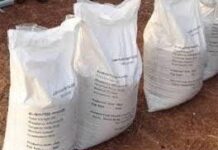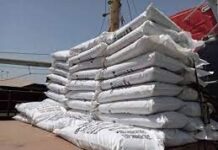CRITICAL BACKGROUND INFORMATION
Climate change is perhaps the greatest challenge facing the world today, especially  Africa, which is and still remains one of the most vulnerable continents to the impacts of climate change. The fifth Assessment Report (AR5) of the Intergovernmental Panel on Climate Change (IPCC) considers it very likely that all of Africa will continue to warm during the 21st century, with far reaching consequences on her natural resource base like agriculture. As agriculture remains a major component of Africa’s economy and the major livelihood activity of most people (75% to 80%) living in the continent, climate change will impact the major drivers (agriculture production, agriculture trade, tourism, etc.) of the economies and the livelihoods of the people in Africa, especially the marginalized rural poor. For the marginalized rural poor African farmers, agriculture is extremely critical for their livelihoods and they have the least adaptive capacity to respond to climatic change, which may be faster and more intense than in the past and for which traditional methods of adaptation may no longer be effective. This phenomenon is referred to as mal-adaptation.
WHY IS AGRICULTURE IMPORTANT IN THE UNFCCC NEGOTIATIONS?
Agriculture is essential for food security and income-generation. The sector also affects critical ecosystem services. The impacts of long-term climatic changes will have significant repercussions for agriculture, requiring adaptation of agricultural systems over time. Furthermore, agriculture has a significant potential to contribute to greenhouse gas (GHG) reduction (through Agroforesty, soil carbon sequestration, minimal application of nitrogen fertilizers to crops, etc). These multiple contributions and unique features suggest that agriculture would benefit from distinct treatments in the context of the UN Framework Convention on Climate Change (UNFCCC) and from a unified approach. Also, the agricultural sector has great potentials for synergies among the objectives of adaptation, food security, poverty reduction, and mitigation. The major challenge for agriculture negotiators, however, is how to maximize these synergies and minimize the trade-offs.
HOW FAR HAVE WE COME?
Advancement of agriculture in the UNFCCC process has been tedious and very slow since in Cancun, Mexico in 2010. Between Cancun (in 2010) and Durban, South Africa (in 2011), agriculture has been ‘mashed’ with issues like aviation, maritime transport, and other industrial issues for negotiations under the Long-term Cooperative Agreement (LCA) of the UNFCCC process. The position of agriculture among these giant polluters made it difficult to justify politically that agriculture emits less GHGs compared to aviation, maritime transport, and others. With hard work and determination, negotiators from the developing world like the Least Developed Countries like The Gambia and Africa as a whole were able to convince the developed world Parties to remove agriculture discussions from under the LCA to under the Scientific Body for Scientific and Technological Advice (SBSTA). From then on, little gains were made for agriculture negotiations up to SBSTA 40 in June, 2014. At the fortieth session of the Subsidiary Body for Scientific and Technological Advice (SBSTA 40), Parties agreed on four topical issues related to agriculture that would be the subject of an in-session workshop at SBSTA 42 ( in June 2015) and SBSTA 44 ( in June 2016). The topics for the in-session workshop at the upcoming June session at SBSTA 42 are to undertake scientific and technical work on:
(a) Development of early warning systems and contingency plans in relation to extreme weather events and its effects such as desertification, drought, floods, landslides, storm surge, soil erosion, and saline water intrusion; and
(b) Assessment of risk and vulnerability of agricultural systems to different climate change scenarios at regional, national, and local levels, including but not limited to pests and diseases.
On that basis, the SBSTA invited Parties and admitted observer organizations to submit to the Secretariat their views on issues relating to the elements referred to in paragraph (a) and (b) above by 25 March 2015, and requested the Secretariat to compile them into a miscellaneous document for consideration at SBSTA 42 (June 2015). The LDC Group, under The Gambia as the Lead Negotiator on Agriculture, has already sent in its Submission to the Chair of the LDC Group for onward submission to the UNFCCC Secretariat.
Sidat Yaffa, Ph.D.
With contributions from CCAFS East Africa Region Office in Nairobi, Kenya.
Contact: [email protected]
]]>
Africa, which is and still remains one of the most vulnerable continents to the impacts of climate change. The fifth Assessment Report (AR5) of the Intergovernmental Panel on Climate Change (IPCC) considers it very likely that all of Africa will continue to warm during the 21st century, with far reaching consequences on her natural resource base like agriculture. As agriculture remains a major component of Africa’s economy and the major livelihood activity of most people (75% to 80%) living in the continent, climate change will impact the major drivers (agriculture production, agriculture trade, tourism, etc.) of the economies and the livelihoods of the people in Africa, especially the marginalized rural poor. For the marginalized rural poor African farmers, agriculture is extremely critical for their livelihoods and they have the least adaptive capacity to respond to climatic change, which may be faster and more intense than in the past and for which traditional methods of adaptation may no longer be effective. This phenomenon is referred to as mal-adaptation.
WHY IS AGRICULTURE IMPORTANT IN THE UNFCCC NEGOTIATIONS?
Agriculture is essential for food security and income-generation. The sector also affects critical ecosystem services. The impacts of long-term climatic changes will have significant repercussions for agriculture, requiring adaptation of agricultural systems over time. Furthermore, agriculture has a significant potential to contribute to greenhouse gas (GHG) reduction (through Agroforesty, soil carbon sequestration, minimal application of nitrogen fertilizers to crops, etc). These multiple contributions and unique features suggest that agriculture would benefit from distinct treatments in the context of the UN Framework Convention on Climate Change (UNFCCC) and from a unified approach. Also, the agricultural sector has great potentials for synergies among the objectives of adaptation, food security, poverty reduction, and mitigation. The major challenge for agriculture negotiators, however, is how to maximize these synergies and minimize the trade-offs.
HOW FAR HAVE WE COME?
Advancement of agriculture in the UNFCCC process has been tedious and very slow since in Cancun, Mexico in 2010. Between Cancun (in 2010) and Durban, South Africa (in 2011), agriculture has been ‘mashed’ with issues like aviation, maritime transport, and other industrial issues for negotiations under the Long-term Cooperative Agreement (LCA) of the UNFCCC process. The position of agriculture among these giant polluters made it difficult to justify politically that agriculture emits less GHGs compared to aviation, maritime transport, and others. With hard work and determination, negotiators from the developing world like the Least Developed Countries like The Gambia and Africa as a whole were able to convince the developed world Parties to remove agriculture discussions from under the LCA to under the Scientific Body for Scientific and Technological Advice (SBSTA). From then on, little gains were made for agriculture negotiations up to SBSTA 40 in June, 2014. At the fortieth session of the Subsidiary Body for Scientific and Technological Advice (SBSTA 40), Parties agreed on four topical issues related to agriculture that would be the subject of an in-session workshop at SBSTA 42 ( in June 2015) and SBSTA 44 ( in June 2016). The topics for the in-session workshop at the upcoming June session at SBSTA 42 are to undertake scientific and technical work on:
(a) Development of early warning systems and contingency plans in relation to extreme weather events and its effects such as desertification, drought, floods, landslides, storm surge, soil erosion, and saline water intrusion; and
(b) Assessment of risk and vulnerability of agricultural systems to different climate change scenarios at regional, national, and local levels, including but not limited to pests and diseases.
On that basis, the SBSTA invited Parties and admitted observer organizations to submit to the Secretariat their views on issues relating to the elements referred to in paragraph (a) and (b) above by 25 March 2015, and requested the Secretariat to compile them into a miscellaneous document for consideration at SBSTA 42 (June 2015). The LDC Group, under The Gambia as the Lead Negotiator on Agriculture, has already sent in its Submission to the Chair of the LDC Group for onward submission to the UNFCCC Secretariat.
Sidat Yaffa, Ph.D.
With contributions from CCAFS East Africa Region Office in Nairobi, Kenya.
Contact: [email protected]
]]>



















